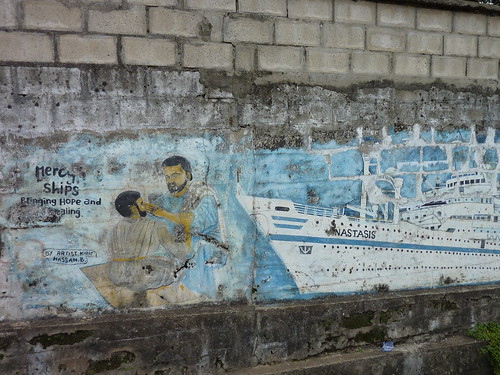When every store in the market sells cigarettes, plastic baubles, t-shirts, household goods, and chinese bras, demand for your wares is exquisitely sensitive. Do enough people come past your door, for example? And are you able, through sheer force of personality, to lure enough of them into your store itself?
Also, do you look normal?
As unfortunate as it is, we've become pretty comfortable with the fact that appearance correlates with income. So it should come as no surprise that, when Amidu's face started swelling, the flow of traffic to his plate shop decreased. And, since plates were his livelihood, this became a problem: eventually, he had to close his shop. After all, there were enough plate-sellers without distorting (and pungent) ameloblastomas on their faces.
Sometimes it's a an unholy litany here. Ameloblastomas, lipomas, hemangiomas, neurofibromas, cystic hygromas—these are bread and butter of surgery for me here on the ship, repeated week after week. And, to a large degree (without getting into the potential for airway compromise, for metastasis, for malignant transformation), these are cosmetic masses. And so what, really, if you have a lump of fat the size of a small melon growing off the back of your neck, as one of my patients tomorrow has? Is it really important?
As a cancer surgeon, I occasionally find myself thinking the same way—these aren't cancers, after all. Isn't there more important surgery I could be doing? Until it hits me that this is more than just surgery. The cosmetic vs. "important", benign vs. malignant dichotomies are not just flawed—they're outright false.
Because every tumor in that litany is a person. And, though Amidu is still on the wards, there's a chance that when he leaves, business slowly return to his shop.
And that is important.
19 June 2011
Unholy litanies
Posted by
M
at
6/19/2011 08:15:00 AM
0
comments
![]()
Labels: Patient stories, Sierra Leone
11 June 2011
Freetown
 Freetown begs description. But I'm going to try anyway.
Freetown begs description. But I'm going to try anyway.
To begin with, it is, hands down, beautiful. This is the fourth West African city I have worked in over the last three and a half years, and it is by far the most picturesque. Mountains rise directly from the Atlantic, and the town is built on their slopes. Tin roofs, of various shades of red and punctuated by minarets of white (and, in a nod to the fact that this country is still the eleventh-worst on the UN's Human Development Index, massive trash dumps), ascend toward the university, which holds pride of place at the top of the hill. The green-white-and-blue tricolor flies everywhere, due in part to the fact that Sierra Leone just celebrated its fiftieth year of independence. And the city is packed with people. Literally. Although numbers are obviously hard to come by, Freetown is home to about 1.2 million people (making it approximately twice the size of Boston proper), who pile themselves into a city initially designed to far fewer. Freetown's population density (about 7,700 people per square mile) rivals that of Los Angeles; its infrastructure does not. Sewage is carried by ditches that edge every street—ditches dug to about the depth of your hip, but filled to your knee (as a crew member found out this weekend) with effluent. During dry weather, the ditches are visible; in the increasingly common rain storms that will carry this country through the monsoons of the summer, they become invisible. Walking requires a preternatural predictive ability, lest you end up in one of them.
Although numbers are obviously hard to come by, Freetown is home to about 1.2 million people (making it approximately twice the size of Boston proper), who pile themselves into a city initially designed to far fewer. Freetown's population density (about 7,700 people per square mile) rivals that of Los Angeles; its infrastructure does not. Sewage is carried by ditches that edge every street—ditches dug to about the depth of your hip, but filled to your knee (as a crew member found out this weekend) with effluent. During dry weather, the ditches are visible; in the increasingly common rain storms that will carry this country through the monsoons of the summer, they become invisible. Walking requires a preternatural predictive ability, lest you end up in one of them.
The city houses West Africa's oldest university, a larger-than-life cotton tree under which Sierra Leone was founded three and a half centuries ago, and street vendors peddling everything from aluminum foil to Obama umbrellas, from cassava to pre-sliced pineapple to street-grilled meat skewers, from shoes to aphrodisiacs. It is a claustrophobic, energetic, sun-beaten, traffic-clogged, beach-fringed city pulsing with life. Count me impressed.
Docked in the port on the eastern end of town (and, unfortunately, about a two-hour, few-kilometer drive to almost any restaurant), the hospital is humming. In the two and a half days of operating I've had this week (Friday was a ship's holiday), I've done 4 mandibulectomies, one parotidectomy, and a couple of smaller cases
Granted, my time here isn't about numbers (or about Obama umbrellas). I will tell you about the patients themselves next week.
More pictures are here.
Posted by
M
at
6/11/2011 04:15:00 PM
0
comments
![]()
Labels: Freetown, Sierra Leone
06 June 2011
Hello, Sierra Leone!
Just so you know: if you no-show on the initial, short-haul leg of your 30-hour travel-to-Africa trip, they cancel your trip.
And by "they," I mean American Airlines. This was discovered the hard way.
But—after two flights, two land-rover rides, one ferry ride, some haggling with American Airlines, an awkward encounter with a Lebanese man, and an almost bribe to an army officer,
Hello, Sierra Leone.
Posted by
M
at
6/06/2011 06:44:00 PM
0
comments
![]()
Labels: Sierra Leone




